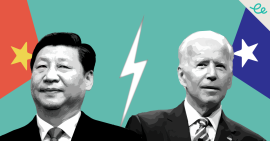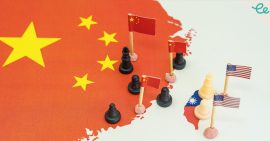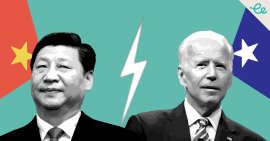After months of talking about talks, and continued turmoil in US China relations, the two countries agreed to meet in Brazil in late November. Donald Trump said trade discussions are “moving along nicely” ahead of his dinner date with Xi Jinping on 1 December. This article is a summary of important US China news in October 2018.
Washington had been refusing to resume trade negotiations until Beijing produced a concrete proposal to address forced technology transfers and other complaints. The US declined to send senior officials to attend the Xi-backed import expo in Shanghai. China’s central bank denied devaluing its currency to weather the trade war. One area of potential conflict may see real concessions from Beijing: a new, top-level court is planned, to hear appeals in IPR cases. Two prominent Chinese economists broke with Communist party orthodoxy to blame the China Model for the trade tensions.
Declining to help Trump escalate his trade fight, the Treasury stated in a report that Beijing was not intentionally devaluing its currency. Treasury Secretary Steven Mnuchin still warned China about lack of transparency and the yuan’s relative weakness, and his department sharpened its language in what appears a final warning.
PBOC governor Yi Gang insisted the government would continue to let the market play a decisive role, and refrain from weaponizing the yuan. In Geneva, Washington pushed the WTO to confront China’s trade abuses, and Beijing defended its preferential rights as a “developing” nation.
Trump signalled US withdrawal from a 144-year-old international postal body that allows China major discounts. Sidestepping the trade war, Exxon Mobil planned to open its first import and storage hub for LNG in China. Progressing with ‘Made in China 2025’, Beijing hopes home-grown 5G mobile technology will push it to the forefront.
Taiwan’s deputy defence minister said it had budgeted several billion US dollars for arms procurement to build up its defence industry in the next two years; Washington has been approving arms deals at a much faster pace. National reunification will not be stopped by any force, stressed China’s Taiwan affairs chief. Xi Jinping told Chinese soldiers to “prepare for war”. The former commander of the US Army in Europe warned that it is very likely the United States will be at war with China in 15 years.
The Sino-US rivalry continued to build on multiple fronts as the trade war escalated. China’s monthly trade surplus with the US reached a record high September, and Trump warned there was much more he could do that would hurt China’s economy further. Beijing represents the greatest long-term counter-intelligence threat to the USA, warned security officials.
Stop finding excuses for US unilateralism and trade protectionism, shot back a Chinese spokesman. Mike Pence’s highly damning speech gathered weight as an inflection point in US-China relations. Treasury Secretary Steven Mnuchin warned Beijing not to engage in the competitive devaluation of its currency, yet Washington appeared unlikely to label China a currency manipulator.
Washington hoped that its revamped NAFTA deal with Mexico and Canada will hurt China’s economy and weaken its position in the global trading system. Combined with punitive tariffs, the USMCA could convince foreign firms to move investment out of China, and force Beijing to make concessions. One provision prevents Chinese firms from using America’s neighbours as a “back door” to ship products tariff-free into the US.
A Chinese destroyer’s near collision with a US warship in the South China Sea was the latest in a lengthening list of confrontations. The US Navy planned a major show of strength in the South China Sea and the Taiwan Strait in November. Beijing is spending big on military hardware, including a new laser satellite tipped to become a “Death Star” for submarines; the Pentagon also worried about US reliance on Chinese suppliers.







Comments are closed.